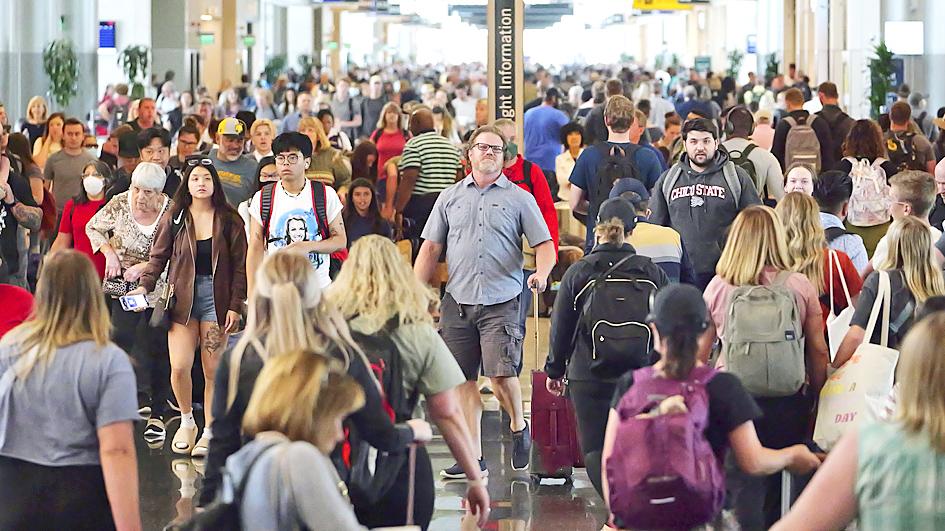Propelled by inflation, the price of air tickets has begun to take off again after tumbling during the COVID-19 pandemic, a reversal that looks set to intensify due to environmental pressures, experts say.
For members of the International Air Transport Association (IATA), gathered in Doha for their annual meeting this week, minds are focused on how far such increases risk undermining passenger growth targets.
The IATA is also pleading for government support in reconciling the long-term commitment to net-zero carbon emissions with those ambitious targets.

Photo: AP
In the US, the average price of an internal flight has shot up, from US$202 in October last year to US$336 last month, according to the Federal Reserve Bank of Saint Louis.
In the EU, the price of a return ticket before tax in April returned to that seen in the same month of 2019, after a near 20 percent fall in 2020, aviation research specialists Cirium said.
The oil price shock stoked by Russia’s invasion of Ukraine is the most obvious factor in these price rises.
Airlines estimate that fuel prices would account for 24 percent of their total costs this year, up 5 percentage points from last year.
Ticket prices are also being stoked by wider inflation — now at 40-year highs in developed markets — as well as stronger-than-expected demand for tickets and labor shortages.
However, Scott Kirby, chief executive of United Airlines Holdings Inc, said despite the trend clearly rising, prices had yet to shoot beyond historical norms.
“In real terms, pricing is back to 2014 levels ... and it’s lower than it was essentially every year before” then, he said. “So ... I don’t think we’re going to see demand destruction.”
Beyond rising costs and fears that government stimulus will fade, airlines face commitments that sit very uneasily alongside each other.
On the one hand, they target carrying a total of 10 billion passengers by 2050, up from 4.5 billion in 2019.
Yet over the same time horizon, they are beholden to achieving net-zero carbon emissions.
The total cost of transitioning the sector to net-zero is estimated by the IATA at an eye-watering US$1.55 trillion.
“Airlines don’t have the ability to absorb” the cost of that transition, IATA director-general Willie Walsh said this week.
To reduce carbon emissions, the industry focus is on sustainable aviation fuels (SAFs), which are two to four times more expensive than fossil-based aviation fuel.
Some governments have already imposed SAF quotas, albeit in small quantities, resulting in airlines in turn imposing surcharges.
On Tuesday, the IATA urged governments to provide subsidies to ensure SAF production reaches 30 billion liters in 2030, up from 125 million liters last year. It also wants price curbs.
However, even if such subsidies are forthcoming, “the transition to net-zero will have to be reflected in ticket prices,” Walsh said.
Could that reverse the long-standing global trend of air travel progressively extending beyond the wealthy?
Krishnan believes such “democratization” will become “harder.”
However, he also said “low-cost airlines have unleashed a world where people living in northern Europe took it for granted that they could go on cheap vacations in southern Europe.”
It would be “very hard for governments to unwind” such entrenched expectations, he said.

Taiwan Transport and Storage Corp (TTS, 台灣通運倉儲) yesterday unveiled its first electric tractor unit — manufactured by Volvo Trucks — in a ceremony in Taipei, and said the unit would soon be used to transport cement produced by Taiwan Cement Corp (TCC, 台灣水泥). Both TTS and TCC belong to TCC International Holdings Ltd (台泥國際集團). With the electric tractor unit, the Taipei-based cement firm would become the first in Taiwan to use electric vehicles to transport construction materials. TTS chairman Koo Kung-yi (辜公怡), Volvo Trucks vice president of sales and marketing Johan Selven, TCC president Roman Cheng (程耀輝) and Taikoo Motors Group

Among the rows of vibrators, rubber torsos and leather harnesses at a Chinese sex toys exhibition in Shanghai this weekend, the beginnings of an artificial intelligence (AI)-driven shift in the industry quietly pulsed. China manufactures about 70 percent of the world’s sex toys, most of it the “hardware” on display at the fair — whether that be technicolor tentacled dildos or hyper-realistic personalized silicone dolls. Yet smart toys have been rising in popularity for some time. Many major European and US brands already offer tech-enhanced products that can enable long-distance love, monitor well-being and even bring people one step closer to

RECORD-BREAKING: TSMC’s net profit last quarter beat market expectations by expanding 8.9% and it was the best first-quarter profit in the chipmaker’s history Taiwan Semiconductor Manufacturing Co (TSMC, 台積電), which counts Nvidia Corp as a key customer, yesterday said that artificial intelligence (AI) server chip revenue is set to more than double this year from last year amid rising demand. The chipmaker expects the growth momentum to continue in the next five years with an annual compound growth rate of 50 percent, TSMC chief executive officer C.C. Wei (魏哲家) told investors yesterday. By 2028, AI chips’ contribution to revenue would climb to about 20 percent from a percentage in the low teens, Wei said. “Almost all the AI innovators are working with TSMC to address the

Malaysia’s leader yesterday announced plans to build a massive semiconductor design park, aiming to boost the Southeast Asian nation’s role in the global chip industry. A prominent player in the semiconductor industry for decades, Malaysia accounts for an estimated 13 percent of global back-end manufacturing, according to German tech giant Bosch. Now it wants to go beyond production and emerge as a chip design powerhouse too, Malaysian Prime Minister Anwar Ibrahim said. “I am pleased to announce the largest IC (integrated circuit) Design Park in Southeast Asia, that will house world-class anchor tenants and collaborate with global companies such as Arm [Holdings PLC],”